

CB Insights sur Twitter : "Damn! @usv has had a billion dollar exit every year for the last 5 years #Unicorn #VC #GOAT? Damn! Union Square Ventures Has Had a Billion Dollar Exit Every Year for 5 Straight Years. Union Square Ventures has notched a remarkable 4 billion-dollar IPO exits & 2 billion-dollar acquisitions since 2011.
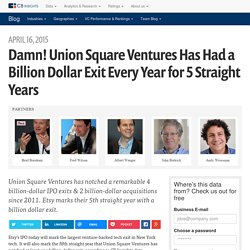
Etsy marks their 5th straight year with a billion dollar exit. Etsy’s IPO today will mark the largest venture-backed tech exit in New York tech. It will also mark the fifth straight year that Union Square Ventures has notched at least one billion-dollar exit, according to CB Insights data. The New York-based venture firm ‘s top hits started off with the $7.7B IPO of Zynga. USV first invested in the gaming firm’s 2008 Series A. The Investor Analytics chart below highlights USV’s exit history – the firm has notched 10 acquisitions and now four IPOs since the start of 2011. Over 500 of tech's most highly valued private companies. The firm’s ability to get in early to some of venture’s biggest exits is more remarkable given the consistency of their fund sizes. Welcome To The Unicorn Club: Learning From Billion-Dollar Startups. Editor’s note: Aileen Lee is founder of Cowboy Ventures, a seed-stage fund that backs entrepreneurs reinventing work and personal life through software.
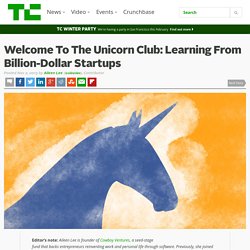
Previously, she joined Kleiner Perkins Caufield & Byers in 1999 and was also founding CEO of digital media company RMG Networks, backed by KPCB. Follow her on Twitter @aileenlee. Many entrepreneurs, and the venture investors who back them, seek to build billion-dollar companies. Trengriffin : QUIZ: If 40 exists in US >... The Billion Dollar Valuation Club. Aileen Lee has a really good post up on TechCrunch, in which she analyzes the number of companies that have been started since 2003 that have gone on to be worth $1bn or more.
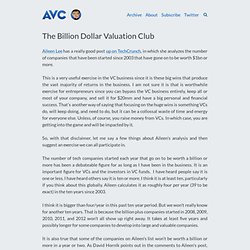
This is a very useful exercise in the VC business since it is these big wins that produce the vast majority of returns in the business. I am not sure it is that is worthwhile exercise for entrepreneurs since you can bypass the VC business entirely, keep all or most of your company, and sell it for $20mm and have a big personal and financial success. That's another way of saying that focusing on the huge wins is something VCs do, will keep doing, and need to do, but it can be a collossal waste of time and energy for everyone else.
Unless, of course, you raise money from VCs. In which case, you are getting into the game and will be impacted by it. The Unicorn Club: where does France stand? Board Observers. Disclaimer: the following analysis has so many caveats that it is hard to enumerate them all. I’m running it for fun so please keep in mind this is a very subjective & data undriven take. Aileen Lee did a very good post a few weeks ago. She analyzes the creation of billion dollar tech startups since 2003 in the US. Key takeaways: Its team found 39 “unicorns” in the tech sector in the US since 2003. How we can improve the odds of finding unicorns. It was my first day at Version One when I realized that finding “VC-fundable” startups would not be easy.
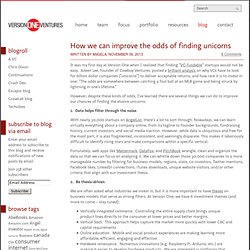
Aileen Lee, founder of Cowboy Ventures, posted a brilliant analysis on why VCs have to look for billion dollar companies (“unicorns”) to deliver acceptable returns, and how rare it is to invest in one: “The odds are somewhere between catching a foul ball at an MLB game and being struck by lightning in one’s lifetime.” However, despite these kinds of odds, I’ve learned there are several things we can do to improve our chances of finding the elusive unicorns: 1. Data helps filter through the noise. With nearly 30,000 startups on AngelList, there’s a lot to sort through. Fortunately, web apps like Mattermark, DataFox, and PitchBook wrangle, clean and organize the data so that we can focus on analyzing it. 2. Counting The Hits. Venture Capital is a hits business.
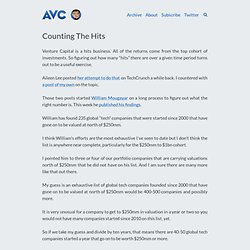
All of the returns come from the top cohort of investments. The Global Unicorns Universe. Aileen Lee was the first to get us hooked to the Unicorn Club trend when TechCrunch released her ground breaking analysis, Welcome To The Unicorn Club: Learning From Billion-Dollar Startups in November 2013.
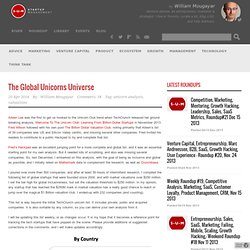
Fred Wilson followed with his own post The Billion Dollar Valuation Club, noting primarily that Aileen’s list of 39 companies was US and Silicon Valley centric, and missing several other companies. Fred invited his readers to contribute to a public Hackpad to try and complete that list. Fred’s Hackpad was an excellent jumping point for a more complete and global list, and it was an essential starting point for my own analysis. But it needed lots of scrubbing, and also was missing several companies. So, last December, I embarked on this analysis, with the goal of being as inclusive and global as possible, and I initially relied on Mattermark data to complement the research, as well as Crunchbase. This list is way beyond the initial TechCrunch unicorn list. Notes.